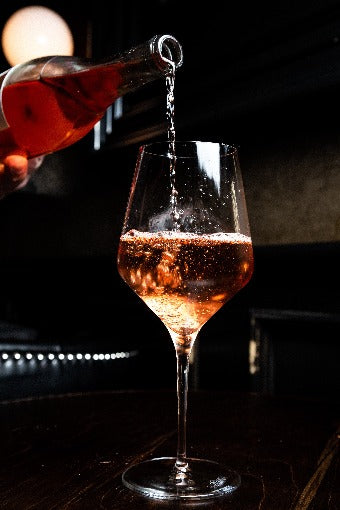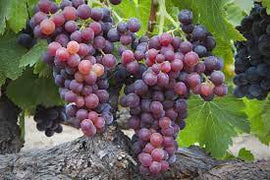Now that summer is in full swing we hope you’re enjoying more rosé than ever, and we are excited to share this month’s selections with you. We’ve found two wines that are somehow similar yet very different at the same time. Both are made from organic Pinot Noir and both have a good amount of minerality on the palate - but that’s where the similarities end. Our first wine is from Sonoma County, while the second comes to you all the way from Germany. One has bold fruit and richness, while the other has high acidity and is super crisp and dry. We think they’ll both have a place at any summertime party or picnic.
At Intent Wines, owner/Winemaker Patrick Callagy’s winemaking intent is to work with hands-on small family growers who use biodynamic or organic farming with each wine reflecting the site, not winemaking interventions. He makes brightly styled wines with a purity and acid-toned freshness, unadorned by over-ripeness or any oak influences. Intent Wines is committed to ecological- friendliness in both farming and packaging. They use eco-friendly, lighter weight glass, natural sugar cane net-zero-carbon cork, and their labels are printed by a local green certified company. After 30 years in winemaking, partner Tim Lowell brings support and harvest help, while Patrick’s wife Kaitlyn handles the business end. The first vintage was 2017, they’re now making 500 cases a year. Their Pinot for this rosé comes from a vineyard located in the western hills of Sebastopol. This 4.5ac north/south facing organic vineyard has 35 year old vines growing on its gentle sloped hill side. Gold Ridge soils and the Petaluma Gap wind influence provide an ideal growing condition for coastal pinot noir.
Across the globe, the Pfalz region of Germany has many superlatives: the world's largest wine festival in Bad Dürkheim, and also the first and best-known wine route, the Deutsche Weinstraße. For over 85 uninterrupted kilometers, Pfalz's vineyards sweep across this remarkably pretty, peaceful land, linking the 130 wine towns of the region between Bockenheim and Schweigen on the border with Alsace.
Reichsrat von Buhl estate winery was founded back in 1849 by Franz Peter Buhl (1809-1862). Before taking the reigns in 1862, sis son Franz Armand was considered one of the most recognized authorities in all practical viticultural matters and was co-founder as well as vice president of the German Viticultural Association. Within a few years von Buhl was recognized for its uncompromising quality. For example, when the opening of the Suez Canal was celebrated in 1869, a von Buhl Riesling (which was one of the most expensive wines in the world at the time) was used for the customary toast. The winery has gone through several iterations within the last 100 years, and was certified organic in 2009. New leadership took over in 2021, and we expect to see more great wines coming from this producer for the next 100 years!
Think Pink!
Carrie Upson- Wine Buyer
|
From: Sonoma, California |
About the Winemaker: Trained as a chef at California Culinary Academy, Patrick honed his winemaking skills by working for 11 years with winemaker Eric Sussman at his highly acclaimed Radio Coteau winery. He works with a “hands off” approach. Native yeast fermentations with no inoculations or additives guide each wine to be a representation of varietal and vineyard. Minimal amounts of sulfites and no use of new oak emphasizing fruit purity.” About the Winemaking: Sourced from the Western edge of the Sonoma Coast, this is a free run juice Pinot Noir Rosé with native yeast fermentation. Concrete egg fermentation, stainless elevage. 50 cases produced 13.3% alcohol Release date March 2022. Tasting Notes: Aromas of fresh strawberry, white peach skin and lime leaf. The wet stone minerality on the palate plays well with the polished mouthfeel from the concrete egg fermentation and mouthwatering acidity rounds out the experience. |
|
Winemaker: Patrick Callagy |
|
|
Price: $25 bottle/$270 case |
|
|
Suggested Food Pairing: Herb roasted chicken Creamy pasta with asparagus Quiche with ham |
|
|
From: Pflaz, Germany |
About the Winery: Reichsrat von Buhl has been a family-owned winery for more than 150 years, and has belonged to the circle of the most prestigious wineries in Germany for just as long. Since it was founded in 1849, Reichsrat von Buhl has made its wines in a terroir-dominated, timeless style that has never been oriented to fashion, but always to the grapes’ origins in the best soils, mainly variegated sandstone with shares of limestone, loess and clay. They are certified organic, and is an active ambassador of both natural, sustainable viticulture and of the best German wines. About the Winemaking: Rosé is a matter of the heart for von Buhl. Their rosé is not a typical Saignée as a by-product of red wine vinification; it is is always an independent main product. The grapes are destemmed and remain on the mash for 8-14 hours. After that they press gently and directly with only 50% juice extraction. Fermentation and Maturation occurs partially in stainless steel and used barrique barrels. It was carefully fermented and aged in stainless steel and used barrique barrels on full yeast until February 2021 without any fining or other technical measures. Tasting Notes: Mouth watering acidity is one of the hallmarks of great German rosé and this bone-dry, certified organic example really shows off the racy nature of these wines. This is a wine of great purity, mineral depth, and textural complexity that features vivid wild strawberry, raspberry, cranberry and meyer lemon flavors. And of course; there’s no residual sugar. |
|
Winemaker: Simone Frigerio |
|
|
Price: $20 bottle / $216 |
|
|
Suggested Food Pairing: Great summer wine for the barbecue on the terrace. Can be served with salmon or other fish dishes. |
|





